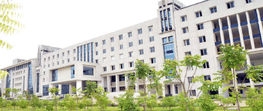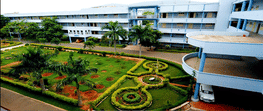Prof. Jagattaran Das is an organic/medicinal chemist with over 25 years of experience in academia and corporate sectors. He received his Ph.D. in Chemistry from the Indian Institute of Science, Bangalore in 1994. After a series of postdoctoral studies at CNRS, Gif-sur-Yvette, France, University of Konstanz, Germany, and Tokyo University, Japan he served as Director of Research at Dr. Reddy’s Laboratories in Hyderabad, followed by Vice President, Drug Discovery Research at Panacea Biotec, Mohali until 2018. Thereafter, he joined Shoolini University, Solan, HP followed by Baddi University of Emerging Sciences & Technologies, Baddi, HP as Professor of Medicinal Chemistry. Before joining GITAM he was a guest faculty at NIPER, Mohali. His research interests include design, synthesis, and SAR studies of molecules having medicinal applications.

You held key positions at various prestigious institutions throughout your career. What is that one thing that made you excited and walk with GITAM University in the journey?
From the very beginning, I wanted to pursue a career in academia. But after my last postdoctoral experience in Japan, I got two offers, one from academics and one from industry. I had the second choice of joining Dr. Reddy's, and I thought that I would take this job as a stepping stone and, after some time, go back to academics. After I joined Dr Reddy's, I started enjoying the application part of my knowledge and decided to continue in industry. I moved on to Panacea Biotec after 5 years. Here, after some time, I realized that I am missing interaction with people in my life and decided to go back to academics, where I can interact with the students, faculty members, and staff members. I switched to academics in 2019, and I started out teaching and sharing my knowledge from industry. During this time, I got this opportunity from GITAM to lead the school of pharmacy as a dean and thought the best part of it could be hand holding some of the young faculty members and mentoring them during my research. It would be beneficial for both of us, as it would also be useful for me to get my ideas implemented. When I visited the campus before joining, I was impressed by the research and lab infrastructure that was available at the GITAM Campus. All these things together kept me connected to this field.
How do you balance the needs of faculty, students, and administration as a Dean of Pharmacy?
The answer to balancing everyone’s needs is transparency and good communication. Irrespective of their position, when you communicate with fellow colleagues and staffs, you must listen to their problems. This clears up the majority of their troubles and respecting every individual is very important. I'm a good listener. In my experience, I have seen that when a person is very angry/frustrated, he/she may not be always looking for a solution but want to vent out his/her anger by expressing his/her feelings, and at that time, if they feel that somebody is carefully listening to their points, half of their problems are resolved. At GITAM, as we follow an open-door policy, my door is open to anyone who has any kind of problem. They can come and meet me at any time and discuss their problems, whether it is a departmental or a personal issue.
As a Dean of School of Pharmacy what is the USP or what are the differentiating factors that make GITAM University stand out from other colleges?
I would say that the first thing would be the adaptability then decision-making process and the research facilities available at Gitam. For adaptability, the NEP- National Education Policy, has been in discussion for quite some time but still not yet been implemented among many institutions in India, but our administration has already initiated the process and it is being discussed for implementation. When it comes to decision-making, once a decision is made by the leadership, a circular is passed to all the faculty and staff members so that everyone is aware of what is happening within the organization.
How do you stay current with the latest trends and developments in the field of Pharmacy and incorporate them into the curriculum and programs offered by GITAM University?
We keep our knowledge up to date through our networking. We have a large network of industry experts and alumni members with whom we are in constant contact. If there are any good articles that have been published recently, they will be shared among the team, and the content will be discussed. We are also guided by the PCI Pharmacy Council of India, where we cannot deviate too much from the syllabus. However, we have the liberty of 15 to 20% modifications, so we have made some elective subjects available to the students that are optional. They can opt for elective subjects like yoga and Computer Science.
How well is GITAM focusing on maintaining industry relationships with companies in order to leverage them for live projects, training, and placements for the students?
It is very important to have collaboration with the industry, knowing their needs and requirements. Giving placement and internship opportunities to students is again a networking game. Many of our faculty are from the industry, and we personally are in contact with dignitaries for placement and training opportunities. Our students are properly trained with the current technology, apart from the theory in class. Getting them exposed to instruments with the help of our well-equipped Murthy (research lab) facility. We allow the students to get exposed to the latest trends by arranging workshops not only for students but also for faculty members for training.
What are the biggest challenges currently facing by Pharmacy colleges, and how do you plan to address them as a dean?
This is not only for the pharmacy industry; most students today gravitate towards computer science. We understand that it is because of the job prospects and basic science and other domains are neglected, particularly even in engineering, civil engineering and mechanical branches. Similar is the case with pharmacy and other branches too. This is a challenge for all academic institutions. This is going to create a gap in the future and it is a problem that we have to address. One of the solutions that I can think of is to use computer science in all other applications like Pharmacy and Civil Engineering and to promote improving the domain through Computer science applications.
What kind of steps GITAM University is taking in order to bridge the gap between academia and the real industry world?
As I mentioned before, through industry networking, we get to know what changes are happening in the industry. We have industry professionals taking special sessions for our students during induction and in between the course programmes. Whenever we get a chance to allow an industry expert to come over and interact, we do that, and we also do this virtually as well. When the students get to know the industry practices, we’ll have a demand from the students asking us to teach the latest technology or subject area. So, it is a win-win situation for the industry as well as for GITAM.











![Indian Institute of Petroleum and Energy - [IIPE]](https://image-static.collegedunia.com/public/college_data/images/appImage/16002398760336.jpg?h=111.44&w=263&mode=stretch)





![Anil Neerukonda Institute of Technology & Sciences - [ANITS]](https://image-static.collegedunia.com/public/college_data/images/appImage/1591266477Cover.jpg?h=111.44&w=263&mode=stretch)

![Vignan's Institute of Information Technology - [VIIT]](https://image-static.collegedunia.com/public/college_data/images/appImage/19177_5.jpg?h=111.44&w=263&mode=stretch)

![Andhra University College of Engineering for Women - [AUCEW]](https://image-static.collegedunia.com/public/college_data/images/appImage/28410_ANUCEW_APP.jpg?h=111.44&w=263&mode=stretch)













![GITAM School of Architecture - [GSA]](https://image-static.collegedunia.com/public/college_data/images/logos/1741581880GITAMLOGO.png?h=72&w=72&mode=stretch)
![GITAM Dental College & Hospital -[GDCH]](https://image-static.collegedunia.com/public/college_data/images/logos/1764687221Screenshot20251202at8.22.59PM.png?h=72&w=72&mode=stretch)







![Gitam Institute of Medical Science & Research - [GIMSR]](https://image-static.collegedunia.com/public/college_data/images/logos/1732968602gimsrlogo.jpg?h=72&w=72&mode=stretch)








.jpeg?h=72&w=72&mode=stretch)
.png?h=72&w=72&mode=stretch)
.png?h=72&w=72&mode=stretch)
.png?h=72&w=72&mode=stretch)



![Centurion University of Technology and Management - [CUTM]](https://image-static.collegedunia.com/public/college_data/images/logos/16190002297038315326908908642635764348829995527831552n.jpg?h=72&w=72&mode=stretch)
![Vignan's Institute of Information Technology - [VIIT]](https://image-static.collegedunia.com/public/college_data/images/logos/148007135655.jpg?h=72&w=72&mode=stretch)
![Aditya Engineering College - [AEC]](https://image-static.collegedunia.com/public/college_data/images/logos/1591109396Annotation20200602201850.jpg?h=72&w=72&mode=stretch)

![Anil Neerukonda Institute of Technology & Sciences - [ANITS]](https://image-static.collegedunia.com/public/college_data/images/logos/1591266477Logo.jpg?h=72&w=72&mode=stretch)

![Sagi Ramakrishnam Raju Engineering College - [SRKR ]](https://image-static.collegedunia.com/public/college_data/images/logos/1697801139logo1.png?h=72&w=72&mode=stretch)
![K L University - [KLU]](https://image-static.collegedunia.com/public/college_data/images/logos/1619098261Logo.jpg?h=72&w=72&mode=stretch)
![Andhra University, College of Engineering - [AUCE]](https://image-static.collegedunia.com/public/college_data/images/logos/1756446694Header.png?h=72&w=72&mode=stretch)
![Mohan Babu University - [MBU]](https://image-static.collegedunia.com/public/college_data/images/logos/1650533803logo200.png?h=72&w=72&mode=stretch)
![VIT University - [VIT- AP]](https://image-static.collegedunia.com/public/college_data/images/logos/1615969516Screenshot20210317134244.png?h=72&w=72&mode=stretch)


![GMR Institute of Technology - [GMRIT]](https://image-static.collegedunia.com/public/college_data/images/logos/1479966276logo.png?h=72&w=72&mode=stretch)
![Raghu Engineering College - [REC]](https://image-static.collegedunia.com/public/college_data/images/logos/1480399520newnew logo.jpg?h=72&w=72&mode=stretch)
![Andhra University - [AU]](https://image-static.collegedunia.com/public/college_data/images/logos/1394863829Andhra University (AU).png?h=72&w=72&mode=stretch)

Comments